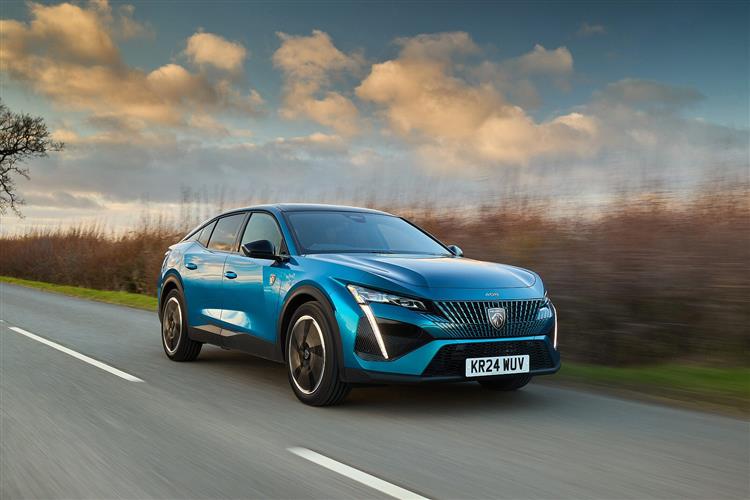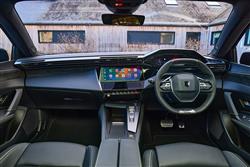A GREATER EIGHT (some text hidden) --NONE--
By Jonathan Crouch
Peugeot brings self-charging Hybrid power to its avant garde 408 family hatch. Jonathan Crouch takes a look.
Ten Second Reviewword count: 36
Your ideal Peugeot 408 might be this one, the Hybrid e-DSC6. You can't plug it in, but if you want this stylised Gallic family hatch, it makes more sense than any other powerplant in the range.
Backgroundword count: 118
The 408 is arguably Peugeot's most avant-garde model. But from launch, to get this more stylised five-door family hatch with an equally advanced engine, you had to pay an awful lot for the top Plug-in Hybrid version. Now though, the 408 range begins with this very advanced model, the Hybrid 145 e-DSC6. This is a Hybrid you can't plug-in - but given that for nearly half the time in urban traffic, it'll run almost completely on battery power, you may not mind that. And you're not carrying around the considerable extra weight of a plug-in system. So this Hybrid 136 is considerably more economical than the PHEV version running combustion power would be. Let's take a closer look.
Driving Experienceword count: 214
As with its close family hatch showroom stablemate, the 308 Hybrid 145 e-DSC6, this self-charging 408 uses this e-DSC6 unit only in its faster 145hp form (smaller Peugeot models like the 208 supermini also get it in lesser 110hp guise). As ever with a full-Hybrid, you have to have an auto gearbox, though this is a rather different kind of self-shifting transmission - and not only because it's of the dual-clutch sort and restricted to six speeds. Built into its casing is a DC inverter, an Engine Control Unit and, most significantly, a little 28hp electric motor powered by a tiny battery secreted beneath the front passenger seat. On the move, this motor can work together with this Hybrid model's 1.2-litre petrol engine - or separately from it. And, unlike with a mild hybrid system like that fitted to say, a rival Volkswagen Golf, here the car can be driven for short urban distances (under 18mph) on electric power alone. During deceleration, the petrol engine stops and the e-motor acts as a generator to recharge the Hybrid system's 48V battery. The battery also stores the energy recuperated by the regenerative braking system. The motor additionally assists the engine under acceleration - such as from standstill to 62mph, which takes 10.2s en route to 131mph.
To see the full road test text contact us on 0330 0020 227
Pictures (high res disabled)

.jpg)
|
.jpg)
|
.jpg)
| |||
.jpg)
|

|
Statistics (subset of data only)
Min |
Max |
|
Price: |
£35,565.00 (At 1 Aug 2025, Allure) |
£38,885.00 (At 1 Aug 2025, GT) |
CO2 (g/km): |
108 |
|
Max Speed (mph): |
131 |
|
0-62 mph (s): |
10.2 |
|
Combined Mpg: |
58.8 |
|
Boot Capacity (l): |
536 |
1583 |
Power (ps): |
145 |
|
Scoring (subset of scores)
Category: Hybrid, Plug-in, Electric & Hydrogen
| Performance | |
| Handling | |
| Comfort | |
| Space | |
| Styling, Build, Value, Equipment, Depreciation, Handling, Insurance and Total scores are available with our full data feed. | |



